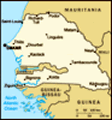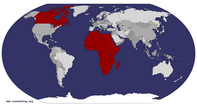Advertisement
Published: November 5th 2010
Dear Family and Friends
Life is starting to settle down into some bizarre rhythm, thus last week nothing of particular happened beside things getting better as opposed to bleaker. I have been working with several different groups, thus my days activities change rather frequently and have little repetition. One day I have painted doors at a centre for talibe, met and interviewed potential host families for volunteers for a local volunteer organization. Others have been spend punching data into excel sheets and calculating stats. Thus things are still influx. Not all has been work, or the search for it. There has been a lot of RnR. Many intermittent days spent reposing by a pool or at a friends place playing drums and sampling smokable products.
Thus I will take this opportunity to just attempt to give you, my lovely readers, a basic understanding of the Senegalese economy. I will start my description with large wide sweeping brush strokes to describe the West African economy and than move on to a more detailed brush to mark a couple of personal experience highlights and observations.
Now a brief history: starting in the early nineties Senegal had a struggling economy, like
every other small third world nation around the world due to the end of the Cold War. The ball game of international trade changed. There were no longer to teams to try and wring money out of. United States had won, they had a monopoly on money, and saw no reason play nice by bribing small semi neutral backwaters with economic deals to keep them from going red. Instead America referred these desperate nations to the IMF and World Bank, who proposed "Economic Restructuring" programs. In other words, Senegal was one of those countries that was in a difficult bind that it did/does not have a homogenous ethnic population, plethora of natural resources to exploit, or highly centralized government among other advantageous aspects for a developing nation. When nations have several or all of these characteristics they often tell IMF and World Bank to go politely fuck themselves when offered "Economic Restructuing." Alas Senegal is not blessed with those feature. It is mostly covered in sub Saharan desert and savannah, and has no fun natural resources to speak of, thus things are kinda bleak. So poor little Senegal is given two options from IMF and World Bank, you either A.
sign this counteract, which stipulates that you open your border, dismantle any subsidies, price modification, and tariffs, for large loans tha have many strings attached, an endless supply of shipping containers filled with the cheapest shit possible, and if turn out to be a good little sub-Saharan backwater you might get some economic investment from multinationals. Or b. Live in the dark. Thus Senegal went for option A. pulled down their pants, bent over and diligently held on to their ankles and prayed to all merciful Allah that the line of eager multinationals, with large intimidating surpluses of cheap subsidized goods, salivating for virgin markets would go easy on them.
Fifteen years later, Senegal has been progressing. The relationship between the west and Senegal has had some ups and downs. The capitalists have been rather rough, but there are tender moments. However, the regions two major historical exports, fish and peanuts, have fallen in value over time as other players dominate the market. Yet his duo, along with a mélange of small industries, enables Senegal to scrounge up today a modest 2 billion dollars of export revenue, this sounds quite nice. Those rich multinationals and nations do give the
odd reach around. However when you put that in perspective with the fact that imports are almost 3 times this, things do not look so romantic any more. Senegal imports about 5 billion $ of consumer crap into the country every year. Thus, the trade contracts signed in the early nineties are still at work causing roughly a 3 billion $ trade deficit each year. Now, you may be asking how does macro economics play into the story? Well wait and see.
So, with that rather, rude sexual metaphor for trade over, we can get down the nitty gritty street level. As I have explained Senegal really has no major lucrative exports. Thus, for most people here, everyone is trying to scratch by. As I have explained with the trade deficient you can find most consumer goods here as at home. Maybe not the same quantity, or variety, but there are big screen tv's here along with all the other accoutrements of capitalism. However, how these get from the shipping containers to the consumer is a much different experience than home.
Instead of colossal monolithic box stores standing tall like palm trees on an atoll surrounded by a sea
of asphalt and cement you have individual people selling items in the dust, stench, and flies of Senegalese streets. You would be surprised on how large the retail sector is in this country. Everyone sells something, people walk down the streets with large coffee containers selling the local "cafe toubas," which are a local version of coffee. The main commercial drag is lined with stalls hawking wares, and usually all the fruit ones congregate with the other fruit ones, etc. sunglasses with sunglasses. Thus the distribution of consumer goods is extremely fragmented at the retail level, but the prevalence of these entrepreneurs always selling the same items indicates that there has to be some concentration of wealth somewhere along the line. This has the side effect that no one person can rise above his/her competitors to realize the American dream by starting their retail empire.
Now, this does not mean every one here is poor. I have been to bars where well dressed local elites consume expensive cocktails and go dance the night away, also you do see nationals driving luxury cars which attract hordes of curious children who are eager to peer into the vehicle. There is a
small middle class and an even smaller rich elite. However, I have yet to run into any kind of extravagant wealth. Which I suppose would be concentrated in larger urban areas.
The majority of these "entrepreneurs" are serving a domestic market. In the touristy parts of town the economy changes, where these entrepreneurs lurk in the shadow of streets waiting for their prey, they prefer the slightly overweight, ma and pa white middle class vacationers, who waddle around town with large cameras hanging from their necks and fanny packs on their waists, which these predators eye hungrily. They hounds almost all whites (known as toubabs in Woolof) displaying all their goods for your view, like a tropical bird displaying his plumage to a prospective mate. After you have seen their merchandise they bombard you with questions on what is a good price of these babbles. Most of the poor confused souls either purchase something to just rid themselves of these pariahs or verbally back peddle as fast as possible. Fortunately for me tourist season is starting, thus they hawkers often avoid me, they can smell my tough stingy meat and know there are better catches.
On the main

 Street vendors
Street vendors
I am scared of getting closer to take pictures. Lets just say I am shy with a cameraarteries of Saint-Louis air conditioned store exist selling the most prestigious items like those much vaunted big screen TV’s. It is rather fascinating how things are packaged. You can purchase water in a bag… often in a small 50ml bag where you tare off an end and drink it. Everything here comes in some kind of bag. At the market vegetables and fish, drowning in flies, are displayed by house wives for purchase. All these goods will be bagged for you, even tomato past can be bought in a bag. Furthermore, there are tiny shops at almost every street corner that never appear to close. Thus if you need your 3 am cigarette you can, and if you can even buy individual cigarettes. Most of the produce is local except for the rice. Oddly enough apparently the south of Senegal grows some the of the worlds highest quality rice that is exported to China. China in returns exports to Senegal the cheapest lowest quality rice. God, you really have to love the ingenuity of capitalism sometimes. As for selection certain vegetables are grown year round here, while others are only in season, thus some things can be very inexpensive one
month, while prohibitively expensive the next and near impossible to find. One thing does stant out. Peanuts! They are the single most popular product, they are sold every where, everyone eats them and they are unbelievably cheap and come in a large veriety of ways. For example you will see portly house wives with a fire, sand and peanuts roasting them. While other, equally maternal looking women, sell roasted peanuts coated in sugar or just salted.
One of the smelly and ugly side effects of capitalism is waste. I have posted some pictures that give you an idea of how waste is disposed. The plastic bags, coffee cops and other trash litter the streets, but other things like shoes etc., are vigilantly used and reused until unusable. In my experience here I have seen only one garbage can, it was by a prestigious hotel indicating it must have been private. The refuse bin’s presence elicited much excitement from locals and tourists alike who both marveled in its mysterious and lonely existence. Thus I am unsure if there is even a state run garbage system. One must exist, but I have yet to encounter it.
In conclusion, here I
will get on my soap box and proclaim much opinions. What this country needs is not more aid, not more money, not more volunteers, etc, I have talked to people, I have seen some stuff, and realistically these people and this country need employment. I had a very interesting conversation with a fisherman when I first arrived here. While we chatted and looked out at the ocean, he told me "Life is hard." Not being able to provide for you family is hard. Watching your children go to school hungry is hard. Living with your family and being unemployed is hard. He told me he struggled to maintain his dignity. He would not beg, but it was hard not too. And to put things in perspective Senegal is actually quite affluent in the region. Yet still the sheer number of idle people and unemployment is astonishing. It is amazing that these people can manage without any real purpose or work in their lives. So many problems, social, poverty, infrastructure, human rights, life style, would change with just a little honest employment. You have to change the structure to change the details. Rearranging deck chairs on the Titanic is great an
all but at times feels like its just to much.
With my meager insight, the problems I listed above all stand in the way of some kind of industry or sector from developing in Senegal. Eg, dry arid climate, overdeveloped and flooded retail sector, declining export values, fragmented population and government, low infrastructure, and sheer poverty are all serious hurdles to overcome. At times I feel like putting my head in the sand, like an ostrich futilely attempting to forget the world and its existence.
I am sorry for missing last week, I will try to make up for my absence by picking up some of the slack for next week. I actually have exciting things planed and should have a couple of tales to yearn about.
Hope all is well with you guys!
Love
Jan
Advertisement
Tot: 0.124s; Tpl: 0.015s; cc: 9; qc: 55; dbt: 0.0616s; 1; m:domysql w:travelblog (10.17.0.13); sld: 1;
; mem: 1.2mb



















brittany
non-member comment
awesomeness
Jan , you are amazing , i love reading your blogs!!!